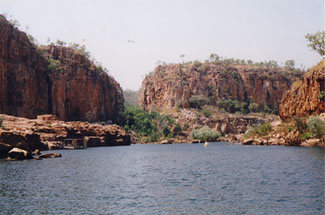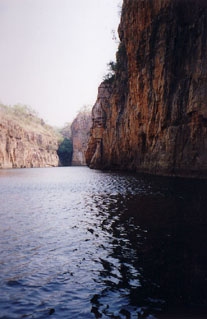|
Welcome To
Laineee Land
|
||
|
Darwin
to Alice Springs
|
|
Darwin is so far from anywhere else in Australia that heading out on the open road involves another ludicrously early start - luckily jetlag and homesickness are still playing their part in my sleep patterns. So it is that I find myself sitting outside the Transit Centre at 5am, waiting for a bus to take me into the bush. Twenty minutes later than scheduled, the Vengabus (I kid you not) turns up, albeit decorated with the Northern Territory Adventure Tours logo. Leaping out of the bus, far too enthusiastically for this time in the morning as far as I'm concerned, is our guide for the next three days. My first impression is of a typical Aussie nutcase (think Steve Irwin) - until he opens his mouth. I'm going to be told all about the Northern Territory by Ray, an Ulsterman. |
|||||
|
We arrive at our campsite outside Katherine just after lunch. There is just enough time for us to get our backpacks out of the bus and into our chosen tents before we head off to Katherine Gorge (Nitmiluk) National Park for the afternoon. Useless fact #6: Katherine Gorge is actually a series of 13 gorges carved through the rock escarpment by torrential rains over millions of years. |
|||||
 |
In the park, which has now been handed back to its original owners, the Jawoyn aboriginal tribe, we are free to either walk around in the baking heat, swim in the Katherine River (bearing in mind that there is no guarantee that there are no crocs around), canoe up some of the lower gorges, or take a leisurely boat trip to the second gorge. It wasn't a difficult decision. |
||||
|
Since it is right in the middle of the dry season, however, the river level is too low to be able to navigate the whole journey to the second gorge by boat, so some walking is required to where (handily) there is a second boat waiting for us. This provides an excellent opportunity to view ancient Aboriginal paintings, which decorate parts of the escarpment. Or so our guide reliably informs us. All I can see are some squiggles, which are so high up and far away that they really could be anything. And I'm paying more attention to keeping my balance on the slippery rocks underfoot, than to what may or may not be painted on the ones above. I take her word for it and am suitably impressed. |
|||||
|
Worryingly, it would seem that the river is inhabited by quite a few crocodiles. Although there is no sign of the fearsome reptiles themselves, there are tracks in the sand leading to where their eggs are buried - the mothers must be around somewhere. Just makes me glad I opted for the boat trip instead of the swimming or canoing. After the boat trip is over, we all pile back on the Vengabus and head back to the campsite. It's actually quite a civilised affair - the tents are permanent constructions which have raised wooden beds with mattresses, there is fairly basic (but fully functional) kithen, and a bathroom block with proper flushing toilets and showers. Compared to what I was expecting, it is positively luxurious! |
 |
||||
| The evening is spent in a leisurely, drunken fashion - drinking beer round a campfire, looking at the stars, contemplating the meaning of life (as you do when drinking beer round a campfire, looking at the stars) | |||||
| The stars in this part of the world are quite incredible, especially since we're in the middle of nowhere and there's no light to disturb the view. For someone from the northern hemisphere it's quite a shock to see absolutely nothing familiar in the night sky. Luckily for me there are two guys from Sydney with us to point out things like the Southern Cross (the star formation which appears on the Australian flag). The Milky Way in particular is impressive - I just can't put into words how I feel looking up and seeing this vast expanse. It's just one of those nights I know I'll remember for the rest of my life. | |||||
|
Nothing, however, could have prepared me for the next night of my journey - sleeping out in the open air in a swag (sort of like a heavy duty, waterproof sleeping bag with hood and built in mattress). To fall asleep looking at the stars (as opposed to drunkenly ruminating on the nature of their existence) is an unbelievable experience, almost enough to make me forget to worry about snakes and spiders and dingoes and all the other dangerous things that Australia is famous for. Useless fact #7: Australia is home to around 170 species of snakes, belonging to six major families. Never in my life has waking up in the morning been such a relief (even in spite of the fact that I have now been awake in time to see sunrise every day since I arrived). Grateful not to have succumbed to some terrible fate during the night, I throw my pack on the bus and head for Alice Springs. |
|||||
08-Feb-2003